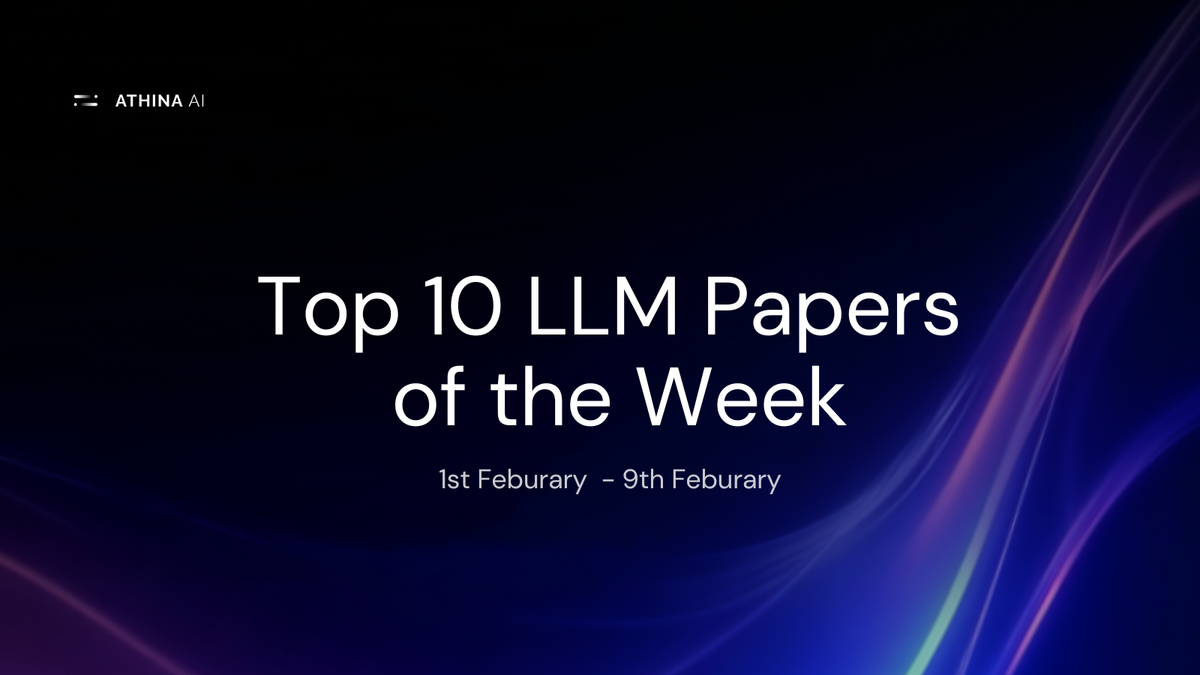Top 10 LLM Papers of the Week: 1st Feb - 9th Feb

As February begins, the AI landscape continues to evolve at an historic pace, with groundbreaking research shaping the future of intelligent systems.
In this article, we spotlight the Top 10 Cutting-Edge Research Papers on AI Agents, RAG, and Benchmarking from this week, breaking down key insights, examining their impact, and highlighting their role in advancing AI capabilities. Let’s dive in.
1) The AI Agent Index
This paper introduces the AI Agent Index, the first public database documenting technical components, applications, and safety measures of deployed agentic AI systems.
It compiles information on system architecture, reasoning methods, tool usage, and risk management practices based on publicly available data and developer input. Findings reveal that while developers detail capabilities and applications, safety and risk management disclosures remain limited.
Why it Matters:
This initiative enhances visibility into agentic AI systems, promoting accountability and safer deployment. By highlighting gaps in risk management disclosures, it encourages better safety practices in AI development.
Read Paper Here, Check out Index Here
2) Learning to Plan & Reason for Evaluation with Thinking-LLM-as-a-Judge
This paper by Meta addresses the challenge of generating structured reasoning traces in LLM-as-a-Judge models, which evaluate AI responses. The authors introduce EvalPlanner, a preference optimization algorithm that first plans an evaluation before reasoning and final judgment.
Through self-training on synthetic data, EvalPlanner outperforms existing models, achieving a 93.9 score on RewardBench and strong results on other benchmarks.
Why it Matters:
EvalPlanner improves AI judgment reliability, enabling more robust and transparent evaluations. Its ability to learn from synthetic data suggests scalable advancements in AI-driven decision-making.
3) Training an LLM-as-a-Judge Model: Pipeline, Insights, and Practical Lessons
This paper introduces Themis, a fine-tuned large language model (LLM) designed for sophisticated, context-aware evaluations. It features scenario-dependent prompts and two novel methods for controlled instruction generation, ensuring adaptability and effective skill distillation from teacher models.
Human-labeled benchmarks validate Themis’s alignment with human judgments, while analysis of the LLM-as-a-judge paradigm uncovers key insights, including limitations of pure knowledge distillation.
Why it Matters:
Themis advances the use of LLMs as reliable evaluative judges, offering a scalable and cost-effective approach to automated assessments. Its findings and resources pave the way for improved AI evaluation methodologies across various domains.
4) GFM-RAG: Graph Foundation Model for Retrieval Augmented Generation
This paper introduces GFM-RAG, a novel graph foundation model designed to enhance retrieval-augmented generation (RAG) by effectively capturing complex query-knowledge relationships.
Unlike conventional RAGs, which struggle with intricate reasoning, GFM-RAG leverages a graph neural network trained on large-scale datasets, including 60 knowledge graphs and 700k documents. It achieves state-of-the-art performance in multi-hop and domain-specific QA tasks without requiring fine-tuning on new datasets, demonstrating strong generalizability and efficiency.
Why it Matters:
GFM-RAG improves knowledge retrieval for LLMs, enabling more accurate and contextually aware responses in complex reasoning tasks. Its ability to generalize without fine-tuning makes it a scalable solution for diverse applications.
5) Multi-Agent Design: Optimizing Agents with Better Prompts and Topologies
This paper by Google introduces Multi-Agent System Search (Mass), an optimization framework that automates the design of multi-agent systems (MAS) by refining prompts and interaction topologies.
Mass employs a three-stage process—block-level prompt optimization, workflow topology optimization, and global prompt optimization—to efficiently explore the MAS design space. The optimized systems outperform existing approaches, leading to new design principles for effective MAS construction.
Why it Matters:
Mass streamlines multi-agent LLM development, reducing manual effort while enhancing system performance, making AI-driven collaboration more scalable and efficient.
6) Rethinking Mixture-of-Agents: Is Mixing Different Large Language Models Beneficial?
This paper challenges the assumption that mixing different LLMs in ensemble methods always improves performance.
It introduces Self-MoA, which aggregates outputs from only the top-performing LLM rather than mixing multiple models. Experiments show that Self-MoA outperforms traditional Mixture-of-Agents (MoA) methods, achieving up to 6.6% higher accuracy on AlpacaEval 2.0 and 3.8% on other benchmarks.
The study also explores the trade-off between diversity and quality, revealing that mixing models can reduce overall output quality. A sequential version of Self-MoA is proposed for real-time aggregation.
Why it Matters:
Self-MoA challenges conventional ensemble strategies, showing that prioritizing model quality over diversity can yield better results. This insight could refine how LLMs are combined for optimal performance in various applications.
7) Enhancing Online Learning Efficiency Through Heterogeneous Resource Integration with a Multi-Agent RAG System
This paper presents an early-stage Multi-Agent Retrieval-Augmented Generation (RAG) System designed to improve online learning efficiency by integrating diverse resources like videos, code repositories, and web content.
Specialized agents retrieve and synthesize information from different sources, automating knowledge discovery and reducing manual effort. A preliminary user study confirms the system’s strong usability and potential for enhancing learning experiences.
Why it Matters:
By automating the retrieval and synthesis of educational content, this system streamlines online learning, making knowledge acquisition more efficient and accessible across various domains.
8) ScoreFlow: Mastering LLM Agent Workflows via Score-based Preference Optimization
This paper introduces ScoreFlow, a framework that enhances multi-agent LLM workflow optimization using efficient gradient-based methods instead of rigid discrete optimization.
It features Score-DPO, a novel preference optimization method that integrates quantitative feedback. ScoreFlow outperforms existing baselines by 8.2% across six benchmarks, improving tasks like QA, coding, and mathematical reasoning.
Why it Matters:
ScoreFlow improves the efficiency and adaptability of multi-agent LLM systems, making AI-driven problem-solving more scalable and cost-effective, particularly for resource-constrained applications.
9) DeepRAG: Thinking to Retrieval Step by Step for Large Language Models
This paper introduces DeepRAG, a framework that models retrieval-augmented reasoning as a Markov Decision Process (MDP) to enhance retrieval efficiency and answer accuracy in large language models (LLMs).
By iteratively decomposing queries, DeepRAG strategically decides when to retrieve external knowledge versus relying on parametric reasoning. Experiments show a 21.99% accuracy improvement, addressing key challenges in task decomposition and redundant retrieval.
Why it Matters:
DeepRAG enhances the reliability of LLMs by reducing factual hallucinations and optimizing knowledge retrieval. Its adaptive approach improves reasoning quality, making it a valuable advancement for AI-driven decision-making and information synthesis.
10) Agentic Reasoning: Reasoning LLMs with Tools for the Deep Research
Agentic Reasoning is a framework that enhances LLM reasoning by integrating external tool-using agents for web search, code execution, and structured memory. It introduces the Mind Map agent, which builds knowledge graphs to improve deductive reasoning.
This approach outperforms existing models in scientific reasoning and deep research tasks, improving knowledge synthesis, scalability, and structured problem-solving.
Why it Matters:
By leveraging real-time retrieval and computation, Agentic Reasoning advances LLM capabilities beyond static inference, making AI more effective for expert-level research and complex decision-making.
Read Paper Here, Check out Code Here
Conclusion
As February begins, this week’s top research continues to drive AI innovation across agents, benchmarking, and retrieval-augmented generation. From refining multi-agent interactions to enhancing retrieval efficiency and evaluation methodologies, these studies highlight the rapid advancements shaping the future of AI. As the field progresses, these breakthroughs will be instrumental in building more intelligent, reliable, and scalable AI systems.
For more insights, check out the Top 10 Papers on AI Agents and RAG from January here
Ready to enhance your AI development? Discover Athina AI—your go-to platform for building, testing, and monitoring AI-driven features.



